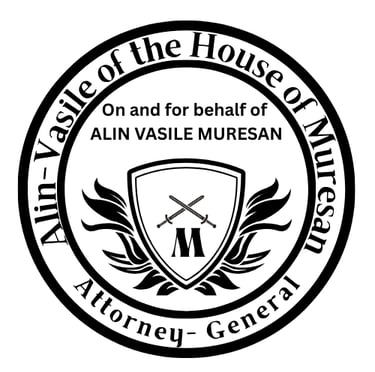What is a STATE?
The state is, ultimately, an abstraction, for it has no existence as a material object, is not confined to a particular space, and is not embodied in any person or collection of persons.” “The 2003 changes and the new responsibilities given to the Lord Chief Justice necessitated a certain amount of
AFFIDAFIT OF TRUTH AND STATEMENT OF FACTBLOGPETER JOSEPH AFFIDAFITSECURITY BY WAY OF A LIEN
3/28/20256 min read
Exhibit (C) The Material evidence of the FACTS 19th Day of January 2015
It is on and for the public record by way of published records at http://www.judiciary.gov.uk/wpcontent/ uploads/JCO/Documents/Speeches/beatsonj040608.pdf
That at the NOTTINGHAM TRENT UNIVERSITY 16 APRIL 2008 the HON. SIR JACK BEATSON FBA spoke the following words. (Supplement 1 Provided)
“The 2003 changes and the new responsibilities given to the Lord Chief Justice necessitated a certain amount of re-examination of the relationship between the judiciary and the two stronger branches of the state --- the executive and the legislature.“ It is clear from the HON. SIR JACK BEATSON FBA spoke words that the office of the Judiciary is a sub office of the state. Therefore there will always be a conflict of interests between any private individual who is not a state company employee, AND there is and will always be a conflict of interests Where a Judge or a magistrate is acting in the office of the judiciary, where the office of the judiciary is a sub office of the state.
What is a State? See (Supplement 2) from the London School of Economics
“1) The state should not be viewed as a form of association that subsumes or subordinates all others. 2) The state is not an entity whose interests map closely onto the interests of the groups and individuals that fall under its authority, but has interests of its own. 3) The state is, to some extent at least, an alien power; though it is of human construction, it is not within human control. 4) The state is not there to secure peoples deepest interests, and it does not serve to unify them, reconcile them with one another, bring their competing interests into harmony, or realize any important good such as justice, freedom, or peace. While its power might be harnessed from time to time, that will serve the interests of some not the interests of all. 5) The state is thus an institution through which individuals and groups seek to exercise power (though it is not the only such institution); but it is also an institution that exercises power over individuals and groups. 6) The state is, ultimately, an abstraction, for it has no existence as a material object, is not confined to a particular space, and is not embodied in any person or collection of persons.”
Also:- “The question now is: what does it mean to say that a state is a corporate entity? The state is a corporation in the way that a people or a public cannot be. “ A number of things are clear from this definition of state from the London School of Economics.
A state is a corporate entity by an act of registration: A Legal embodiment by an Act of registration.
A state has no obligations to anything other than the state and to the exclusion of anything or anybody else.
A state is nothing of material substance but only a construct of the mind.
All that is created by the same process is equal in status and standing to anything else that is created by the same process. There is a peer relationship of equals that are separate legal embodiments. Consider the graphic representation for those that are feeble of mind. If there is any disagreement to the above stated FACT, then they should take this up with the Rt. Hon Lord Chief Justice Sir Jack Beatson FBA. The Facts Are the Facts. This is the material evidence of the FACTS.
From the Supplement 2, Definition of State from the London School of economics.
“The question now is: what does it mean to say that a state is a corporate entity? The state is a corporation in the Way that a people or a public cannot be. “A Corporation is a legal embodiment by an act of registration.......
To be legal then there has to be a meeting of the minds and an agreement between two parties. Legal is by agreement. So by agreement:-
The state should not be viewed as a form of association that subsumes or subordinates all others.
The state is not an entity whose interests map closely onto the interests of the groups and individuals that fall under its authority, but has interests of its own.
The state is, to some extent at least, an alien power; though it is of human construction, it is not within human control.
The state is not there to secure peoples deepest interests, and it does not serve to unify them, reconcile them with one another, bring their competing interests into harmony, or realize any important good such as justice, freedom, or peace. While its power might be harnessed from time to time, that will serve the interests of some not the interests of all.
The state is thus an institution through which individuals and groups seek to exercise power (though it is not the only such institution); but it is also an institution that exercises power over individuals and groups.
The state is, ultimately, an abstraction, for it has no existence as a material object, is not confined to a particular space, and is not embodied in any person or collection of persons.
If a carpenter were to register a chair he had made. There is the act of registration, then the certificate of registration where two parties have agreed that there is a chair...The point being that there is a chair and this chair is of material substance. A legal embodiment by an act of registration where there is nothing of material substance created, is nothing more than a figment of the mind that has agreed to create nothing of material substance. This very legal agreement is an act of fraud by deception. The state is, ultimately, an abstraction, for it has no existence as a material object, is not confined to a Particular space, and is not embodied in any person or collection of persons. The State which is a legal embodiment is of no material substance. How is it possible that:-
A legal embodiment by an act of registration which is of no material substance by default, or
A State, which is of no material substance by default, or
A Corporation, which is of no material substance by default
How is it possible that something of no material substance in fact or which is a fiction of the mind can:-
Have a life of its own, or
Claimed to have Authority over another, or
Can be held responsible, or
Have a liability, or
holds property, or
Have any form of powers or
Be in any way or have any form of legitimacy in existence, or
Undertake an act of force.
It is quite clear that, Chandran Kukathas, Department of Government and the London School of Economics, have had great difficulty defining what a state is. Why are we not surprised at this? It is not possible to define or give definition to or to legitimise something which is of no material substance and is a figment of the imagination. Fraud however has been clearly defined as a criminal act with full knowledge and intent to engage in criminal behaviour for the personal gain of oneself or another, to the expense of another party. To bring about by an act of force, support of this same fraud and criminal intent is also clearly recognised as act of terrorism. So it is quite clear and has been confirmed by the Rt. Hon Lord Chief Justice Sir Jack Beatson FBA, who has achieved the highest status within the office of the Judiciary as Lord Chief Justice that. This Land by the name of England and the (United Kingdom (Private corporation)) which extends to the common wealth is run definitively by terrorists who maintain their status by fraud and deception to the expense of others by acts of force where there is no legitimacy and can be no legitimacy to the fact that a state is a legal embodiment by an act of registration of which there is no material substance to support that fact and by maintaining that parliament reigns supreme, where the legal definition of Statute which is a” legislative rule given force of law by the consent of the governed” Where there has been no consent of the governed and there is no material evidence that the governed have given their consent to legitimise this claim to supremacy and authority See Case authority and exhibit (B) Case Authority No WI 05257F . David Ward. V. Warrington Borough Council, Which by all accounts holds executive status within the STATE. Above that of the legislation and cannot be held accountable to that legislation as the status of the officers is superior to the legislation. The Facts Are the Facts. This is the material evidence of the FACTS. Supplement 1. Supplement 1.http://www.judiciary.gov.uk/wp-content/uploads/JCO/Documents/Speeches/beatsonj040608.pdf http://philosophy.wisc.edu/hunt/A%20Definition%20of%20the%20State.htm
for more information and full version of the Affidafit click Here
To remember your true status
To awaken to the frauds of presumption
To reclaim your birthright
To reject being surety for debts you never agreed to
To establish your own house in honour, record, and remedy exploring the intersection of law, belief, and representation.






📜 If the Living have vanished, and you are left behind — Read This Scroll
Houe of Muresan © 2025. All rights reserved.
By viewing this website and or pages, you accept notice of private jurisdiction.
Any action against the NAME incurs full liability under lien and law.
